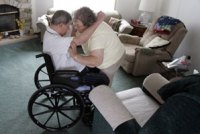Latest KFF Health News Stories
Will Private Long-Term Care Insurance Supplement the CLASS Act?
CLASS takes a step towards moving long-term care financing from the welfare-like Medicaid program to an insurance-based system. But CLASS alone won’t get there. Private insurance, currently a niche product that covers only about seven million Americans, will have to play an important role as well.
In Kansas, Small Medicaid Cuts Have Big Impact On Some Seniors
In Kansas, cuts to Medicaid in-home services for the elderly produce quick consequences for some people who have had to move out of their apartments and into nursing homes.
New Long-Term Care Insurance Will Provide Flexible Cash Benefits
The CLASS Act, part of the health care overhaul, will provide about $75 a day to people who sign up for the long-term care insurance policy. Advocates say it could help people stay in their homes. But critics raise concerns about the financial viability of the program.
Tennessee Removes About 100,000 People From Medicaid Rolls
The TennCare cuts, which followed the resolution of a long-running court battle, affected mostly elderly or disabled residents, including approximately 37,000 who had relied on the state program for all their health care needs.
Long-Term Care Program Debuts In New Health Law
The act will promote saving for long-term assistance and will especially benefit senior citizens. This story comes from our partner NPR News.
Drug Prices Rise For Seniors Who Reach Medicare Part D Coverage Gap
Seniors who reach the “doughnut hole” for prescription medications find that price increases are far outpacing inflation, according to a Kaiser Family Foundation study.
Midnight Munchies Keep Elderly Safer In NY Nursing Home
Like many nursing homes, the Parker Jewish Institute in New Hyde Park, N.Y., was having problems with some of its patients with dementia wandering at night. The staff worried about falls, but they didn’t want to hand out more psychotropic medicines. But one night in 2007, a nursing assistant accidentally stumbled on a solution.
Public Reverse Mortgages and Long-Term Care: Can They Work Together?
What if your state helped you turn unused home equity into cash to pay for the care you need when you become old and frail?
What Price For Medical Miracles? High Costs At End Of Life Still Part Of National Health Debate
Finding the right balance between too much and too little care is excruciating and highly personal for physicians, patients and families – one reason it’s not discussed at a national level. This reluctance is mirrored by an unwillingness by lawmakers to confront hard choices on medical spending.
Bunny’s Last Days: When Living Will Isn’t Enough
In the era of modern medicine, there is often no easy way to navigate between an acceptable quality of life and a death with dignity. But palliative care specialists, relatively new players on the health care scene, offer comfort, support, pain control and, if requested, spiritual counsel, helping people sort through often confusing and ambiguous medical options.
Living wills and advance directives were the hope for end-of-life decision-making decades ago. But a 2004 survey by FindLaw found that 36 percent of Americans have a living will, and even when people have filled out living wills, doctors often ignore them.
Hospice, Palliative Care Aim To Ease Suffering
Palliative services are designed to help patients and their families sort through their options – ome of which may help restore the patient, while others may increase suffering for a minimal health benefit.
Catholic Directive May Thwart End-Of-Life Wishes
A directive passed last November in Tulsa, Okla., raises fresh questions about the ability of patients to have their end-of-life treatment wishes honored – and whether and how a health care provider should comply with lawful requests not consistent with the provider’s religious views.
Why Are Fewer Patients Enrolling in Hospice?
It is not clear why it’s happening, but some hospice officials blame both a bad economy and Medicare rules that unintentionally discourage doctors from referring all but those who are about to die.
For Senior Care, Sometimes It Does Take A Village
Nearly three years ago, Harry Rosenberg and his wife, Barbara Filner, met with nine of their neighbors about starting an aging-in-place “village” in Bethesda, Maryland. The idea: If neighbors could help one another with basic services such as transportation and simple home maintenance and with friendly visits, people could stay in their homes longer as they aged.
Obama’s Respite Care Plan: Part of the Problem, Not a Solution
Families should be freed from the whims of politicians and the inevitable battles over government dollars by passing a national long-term care insurance program, such as the proposed CLASS Act.
How Does U.S. Long-Term Care Stack Up Against the Rest of the World?
There are two important lessons from the European experience with long-term care.
Why $75-A-Day Matters to Caregivers
Critics of the CLASS Act argue that $75-a-day is insufficient. But a new study shows that millions could benefit.
Caring For Elderly And Disabled Is A Family Affair
A new study says almost one out of three adults in the U.S. currently serves as a caregiver. The time and energy they put into caregiving becomes like an unpaid job.
The CLASS Act: A Flawed But Powerful Game-Changer for Long-Term Care
Pay attention to the CLASS Act. It can not only provide better long-term care for those who so desperately need this assistance, it can also become a new way to help those in need in an era of $1 trillion-plus budget deficits. But only if it is done right.










